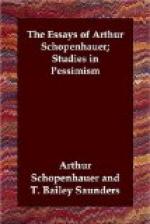Let us hope that the more intelligent and refined among the nations will make a beginning in this matter, and then that the Germans may take example by it and follow suit.[1] Meanwhile, I may quote what Thomas Hood says of them[2]: For a musical nation, they are the most noisy I ever met with. That they are so is due to the fact, not that they are more fond of making a noise than other people—they would deny it if you asked them—but that their senses are obtuse; consequently, when they hear a noise, it does not affect them much. It does not disturb them in reading or thinking, simply because they do not think; they only smoke, which is their substitute for thought. The general toleration of unnecessary noise—the slamming of doors, for instance, a very unmannerly and ill-bred thing—is direct evidence that the prevailing habit of mind is dullness and lack of thought. In Germany it seems as though care were taken that no one should ever think for mere noise—to mention one form of it, the way in which drumming goes on for no purpose at all.
[Footnote 1: According to a notice issued by the Society for the Protection of Animals in Munich, the superfluous whipping and the cracking of whips were, in December, 1858, positively forbidden in Nuremberg.]
[Footnote 2: In Up the Rhine.]
Finally, as regards the literature of the subject treated of in this chapter, I have only one work to recommend, but it is a good one. I refer to a poetical epistle in terzo rimo by the famous painter Bronzino, entitled De’ Romori: a Messer Luca Martini. It gives a detailed description of the torture to which people are put by the various noises of a small Italian town. Written in a tragicomic style, it is very amusing. The epistle may be found in Opere burlesche del Berni, Aretino ed altri, Vol. II., p. 258; apparently published in Utrecht in 1771.
A FEW PARABLES.
In a field of ripening corn I came to a place which had been trampled down by some ruthless foot; and as I glanced amongst the countless stalks, every one of them alike, standing there so erect and bearing the full weight of the ear, I saw a multitude of different flowers, red and blue and violet. How pretty they looked as they grew there so naturally with their little foliage! But, thought I, they are quite useless; they bear no fruit; they are mere weeds, suffered to remain only because there is no getting rid of them. And yet, but for these flowers, there would be nothing to charm the eye in that wilderness of stalks. They are emblematic of poetry and art, which, in civic life—so severe, but still useful and not without its fruit—play the same part as flowers in the corn.
* * * * *
There are some really beautifully landscapes in the world, but the human figures in them are poor, and you had not better look at them.




